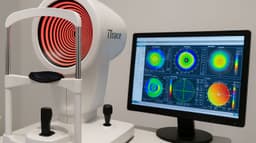
50 Fast FAQs About Myopia
In the early part of the 20th century, the incidence of myopia in Europe was about 20%. It has now exceeded 50% and is continuing to increase. There are many theories as to why this is happening but none of them is conclusive.
This increase in myopia began before the advent of the iPhone and computer screen and continues.
The World Health Organisation predicts that by 2050 half of the entire world’s population will be myopic.
Myopia, commonly known as nearsightedness, is a prevalent vision condition affecting millions worldwide. This refractive error alters how light focuses within the eye, making distant objects appear blurred while close ones remain clear. Understanding myopia is crucial for effective management and care. In the following 50 facts, we delve into the intricacies of myopia, covering its causes, prevalence, impact on daily life, available treatments, and more. Whether you're seeking information for yourself or a loved one, these facts aim to provide comprehensive insights into this common eye condition.
FAQs About Myopia
- What is myopia?
- Myopia, commonly known as nearsightedness, is a refractive error of the eye that causes distant objects to appear blurry while close objects can be seen clearly.
- What are the common symptoms of myopia?
- Common symptoms of myopia include blurry vision when looking at distant objects, squinting, headaches, and difficulty seeing clearly while driving or playing sports.
- How does myopia affect vision?
- Myopia occurs when the eyeball is too long or the cornea is too curved. This causes light to focus in front of the retina instead of on it, resulting in blurry distance vision.
- Is myopia hereditary?
- Yes, myopia often has a genetic component. If one or both parents have myopia, there's an increased likelihood that their children may also develop the condition.
- At what age does myopia typically develop?
- Myopia often starts during childhood and can progress until the late teens or early twenties. However, it can also develop later in life.
- Can myopia be prevented?
- While myopia's development can't always be prevented, outdoor activities, limiting screen time, and maintaining good eye health practices can help reduce the risk.
- What causes myopia to progress?
- Myopia can progress due to factors like genetics, environmental influences, and prolonged near work without adequate breaks.
- How is myopia diagnosed?
- An eye care professional diagnoses myopia through a comprehensive eye exam, which may include a visual acuity test and refraction test.
- What is the treatment for myopia?
- Myopia can be treated with corrective lenses (glasses or contact lenses), orthokeratology, and refractive surgery.
- Can myopia be corrected with eyeglasses?
- Yes, eyeglasses with the appropriate prescription can correct myopia and provide clear vision.
- Are contact lenses a suitable option for myopia correction?
- Yes, contact lenses are a popular and effective option for correcting myopia. They provide clear vision without the need for glasses.
- What is LASIK surgery, and can it correct myopia?
- LASIK (Laser-Assisted In Situ Keratomileusis) is a surgical procedure that can correct myopia by reshaping the cornea. It is a popular option for myopia correction.
- Is myopia reversible?
- In most cases, myopia is not reversible. However, it can be effectively managed and corrected with various treatments.
- What is high myopia, and how is it different from regular myopia?
- High myopia refers to a severe form of nearsightedness where the degree of refractive error is significantly higher than average. It carries an increased risk of certain eye conditions.
- Can myopia lead to other eye conditions?
- Yes, high myopia can increase the risk of conditions like retinal detachment, cataracts, and glaucoma.
- How often should a person with myopia have their eyes checked?
- Individuals with myopia should have regular eye exams, typically annually or as recommended by their eye care professional.
- What are the risks associated with high myopia?
- The risks associated with high myopia include retinal detachment, glaucoma, cataracts, and other vision-related complications.
- Can myopia be corrected in children?
- Yes, myopia can be corrected in children through the use of glasses, contact lenses, or specialised treatments like orthokeratology.
- Are there exercises to improve myopia?
- While exercises can help with overall eye health, they are not typically effective in reversing or improving myopia.
- Can myopia be worsened by spending too much time on screens?
- Prolonged screen time may contribute to eye strain, but it is not a direct cause of myopia. However, outdoor activities are associated with a reduced risk of developing myopia.
- Can myopia be caused by reading in low light?
- Reading in low light can contribute to eye strain, but it is not a direct cause of myopia.
- Is it possible to outgrow myopia?
- While myopia may stabilise in adulthood, it is unlikely to be outgrown entirely without intervention.
- Can myopia be caused by eye strain?
- Eye strain can exacerbate existing myopia, but it is not a primary cause of the condition.
- What is the difference between myopia and astigmatism?
- Myopia is a refractive error that affects the ability to see distant objects clearly, while astigmatism is a condition where the cornea or lens has an irregular shape, causing distorted vision.
- Is it safe to drive with myopia?
- With appropriate corrective lenses, individuals with myopia can drive safely. It is essential to wear glasses or contact lenses that correct the refractive error.
- Can myopia affect a person's depth perception?
- Myopia can affect depth perception, particularly for those with high degrees of nearsightedness.
- Can myopia be corrected with specialised lenses for sports or outdoor activities?
- Yes, there are specialised lenses for sports and outdoor activities that can correct myopia while providing optimal vision during physical activities.
- Are there natural remedies for myopia?
- While there are no natural remedies to reverse myopia, a healthy lifestyle, including regular outdoor activities and a balanced diet, can contribute to overall eye health.
- What is the impact of myopia on children's learning abilities?
- Untreated myopia in children can lead to difficulty in reading the board or seeing distant objects in the classroom, potentially affecting their learning experience.
- Is it safe to wear contact lenses overnight if you have myopia?
- It is generally not recommended to wear contact lenses overnight, as it may increase the risk of eye infections and discomfort. Consult with an eye care professional for specific advice.
- Can myopia be related to other health conditions?
- Myopia is primarily a refractive error, but it can sometimes be associated with certain systemic health conditions.
- Is there a link between myopia and diabetes?
- While myopia is not directly caused by diabetes, individuals with diabetes may have an increased risk of developing vision-related complications, including myopia.
- Can myopia be caused by nutritional deficiencies?
- Severe nutritional deficiencies may contribute to overall eye health, but they are not a direct cause of myopia.
- Can pregnancy affect myopia?
- Pregnancy can lead to temporary changes in vision, but these changes are usually minor and do not typically cause myopia.
- What is the relationship between myopia and glaucoma?
- Myopia is a risk factor for certain eye conditions, including glaucoma, but they are not directly related.
- Are there any foods that can help manage myopia?
- A balanced diet rich in nutrients like vitamins A, C
- Is there a connection between myopia and reading habits?
- Excessive near work, such as reading for extended periods, can contribute to the development and progression of myopia, especially in children.
- How can myopia impact a person's career choices?
- Myopia can affect career choices in occupations that require excellent distance vision, such as pilots or military personnel. Corrective measures like glasses or contacts can often address this.
- Can myopia be corrected in elderly individuals?
- Yes, myopia can be corrected in elderly individuals through the use of glasses or contact lenses. However, surgical interventions like LASIK may be less common in older age due to other health considerations.
- Can myopia be caused by hormonal changes?
- Hormonal changes, such as those during puberty, can influence the progression of myopia, but they are not a direct cause of the condition.
- What Are The Future Treatments for Myopia
- Ongoing research in the field of ophthalmology is exploring innovative treatments for myopia. Promising approaches include pharmaceutical interventions, specialised contact lenses, and advanced surgical techniques, all aimed at not only correcting myopia but also potentially slowing its progression. These future treatments hold the potential to revolutionise how we manage and address this common refractive error, offering even more personalized and effective solutions for individuals with myopia.
- Can myopia be related to posture or body positioning?
- Poor posture or excessive screen time with improper ergonomics may contribute to eye strain, but they are not direct causes of myopia.
- How can myopia affect a person's quality of life?
- Myopia can impact a person's daily activities, especially those that require clear distance vision like driving or watching movies. It may also affect social interactions.
- Is there a connection between myopia and migraines or headaches?
- While myopia itself does not directly cause migraines or headaches, eye strain from uncorrected myopia can contribute to these conditions in some individuals.
- Can myopia be caused by certain medications?
- Some medications may have side effects related to vision, but they are not direct causes of myopia.
- Can myopia lead to social or psychological effects?
- Uncorrected myopia can lead to social and psychological effects, such as reduced confidence or self-esteem, especially in children and adolescents.
- What is the cost of myopia correction treatments?
- The cost of myopia correction treatments can vary depending on the method chosen (glasses, contacts, or surgery) and individual factors. It's best to consult with an eye care professional for specific pricing.
- Where can individuals with myopia find reliable information and support?
- Individuals with myopia can find reliable information and support from reputable sources like optometrists, ophthalmologists, and organisations dedicated to eye health. Online resources from recognised medical institutions can also provide valuable information.
- Can myopia be related to autoimmune disorders or allergies?
- While there may be associations between autoimmune disorders and certain eye conditions, they are not direct causes of myopia. Allergies, if severe, can lead to temporary changes in vision, but they do not typically cause myopia.
- Can myopia affect a person's eligibility for certain professions or activities?
- Yes, certain professions or activities, such as military service, aviation, or law enforcement, may have specific vision requirements. Myopia, especially if severe, may impact eligibility. However, corrective measures like glasses or contact lenses can often address this issue.

An Eye Clinic You Can Trust
Experience exceptional eye care with My-iClinic, a trusted leader in vision solutions. Our team of dedicated ophthalmologists and cutting-edge technology ensure top-tier treatment for all your eye health needs. Whether it's myopia management, cataract surgery, or laser vision correction, we're committed to delivering personalised, world-class care. Schedule your appointment today and embark on a journey to a clearer, healthier vision with My-iClinic.
Find out more by Speaking to our team









